

How Some Mistakes Can be Generative for Teachers and Students Alike - MindShift. Mistakes are not the only things that vary.
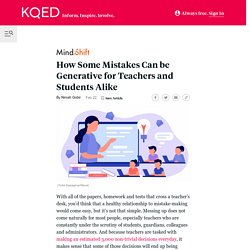
The impact changes too. “It’s not just that our mistakes affect us differently because of where we stand in the world, but also that our mistakes affect students differently because of their identities,” Cruz explains in her book. There are some mistakes where the impact can be so harmful to kids that adults should establish “zero-fail missions” to make sure failure is unlikely to occur.
Teaching students to read and having students see themselves in their curriculum are important research-backed zero-fail missions, Cruz says. “We have a habit of picking the wrong zero fail missions that are often based on tradition and belief, and not fact.” How grades can create a class culture based on “failure-rich” learning Grading systems both penalize learners who make mistakes and limit high achieving students.
During the pandemic, grading has become even more complex and contentious with many students receiving failing grades in academic subjects. Encourage Student Participation With The Stand Up Game. Weekly Free Video. School Improvement Episode 29: Teacher attrition and retention -… This podcast from Teacher is supported by Bank First.
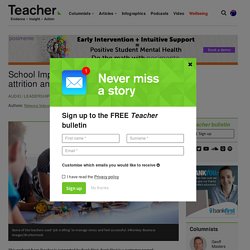
Bank First is a customer owned bank, committed to supporting the financial wellbeing of the education community since 1972. Thanks for listening to this School Improvement episode from Teacher magazine, I’m Rebecca Vukovic. What contributes to a teacher’s decision to leave the profession? And, at the same time, why do others thrive and find success and personal fulfillment at work? Hugh Gundlach is a researcher and pre-service teacher educator at the Melbourne Graduate School of Education at the University of Melbourne.
Rebecca Vukovic: Hugh Gundlach, thanks for joining Teacher magazine. Hugh Gundlach: Thanks for having me Rebecca. RV: So we’re today to talk about attrition and retention of the teacher workforce. HG: Sure. And so I was kind of interested in what else might be out there. RV: And in contrast then, what are some of the key reasons teachers choose to leave the profession? RV: Really interesting. HG: Absolutely. Strong start, Great teachers.
Supervising preservice teachers - online training program. A whole school mentoring program. At Kadina Memorial School, on South Australia’s Yorke Peninsula, everyone going into a new role is given a mentor – from new graduates who are just joining the school, to experienced practitioners.
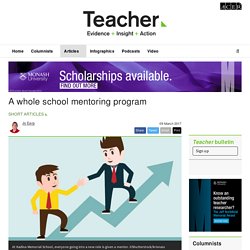
‘So, if it’s your first time in leadership, your first time as deputy, your first time as head of school – whatever role it is,’ Principal Dean Angus tells Teacher. A consistent approach Angus, who is currently on secondment to the state education department as a regional director, oversaw the amalgamation of Kadina’s primary and high schools to form the R-12 school in 2012. He developed the mentoring program as a process for use throughout the new school. Mentoring is part of the induction process for beginning teachers at Kadina. ‘It’s all about sustainability, all about people coming into a site and understanding how this site works. ‘For the heads in a leadership role, probably more on a fortnightly basis or longer depending on the position and how much support they need,’ Angus explains. Beginner teachers: Induction and mentoring.
Induction and mentoring are not ‘new’, with substantive research available in the area.
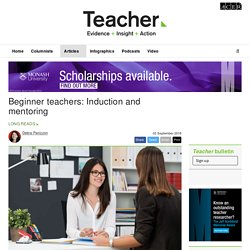
In most of these studies though, induction and mentoring are usually associated with teacher retention, particularly in countries like the United States where 40-50 per cent of teachers are reported to leave the profession in the first five years (Ingersoll, 2003). The case is different in Australia, where the focus of induction and mentoring is placed squarely around quality teaching and the need to support our next generation of teachers in developing their knowledge, expertise and professional competency. While the two terms are often linked, induction and mentoring are quite different in their focus and intention. Supervising preservice teachers - online training program. Creating a positive practicum experience. In a recent episode of The Research Files, we brought you news of an Australian study exploring the highs and lows of the practicum experience for pre-service teachers.
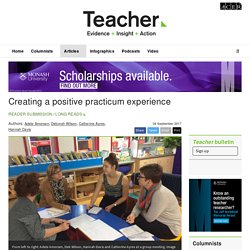
One of the themes to emerge from the research was the importance of good mentoring. Here, two supervising teachers and two pre-service teachers who worked together in Semester One 2017 reflect on some of the elements that helped to drive a positive practicum experience for everyone involved. The Action Now: Classroom Ready Teachers report of 2014 made recommendations on how to better prepare graduate teachers in Australia with the practical skills required for classroom work. It concluded that the single most significant action would involve close partnerships between universities, school systems and schools in an attempt to provide a more integrated delivery of initial teacher education (Teacher Education Ministerial Advisory Group, 2014). What can supervising teachers do? What can pre-service teachers do? References. Teacher ACER.